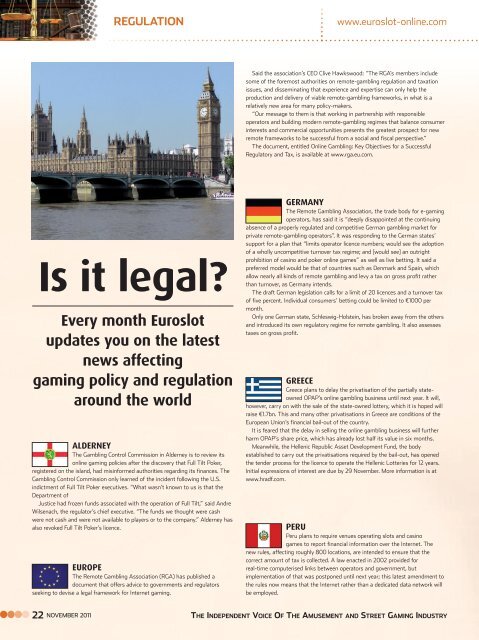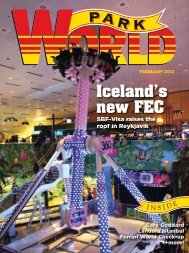November 2011
November 2011
November 2011
Create successful ePaper yourself
Turn your PDF publications into a flip-book with our unique Google optimized e-Paper software.
REGULATION<br />
Is it legal?<br />
Every month Euroslot<br />
updates you on the latest<br />
news affecting<br />
gaming policy and regulation<br />
around the world<br />
ALDERNEY<br />
The Gambling Control Commission in Alderney is to review its<br />
online gaming policies after the discovery that Full Tilt Poker,<br />
registered on the island, had misinformed authorities regarding its finances. The<br />
Gambling Control Commission only learned of the incident following the U.S.<br />
indictment of Full Tilt Poker executives. “What wasn’t known to us is that the<br />
Department of<br />
Justice had frozen funds associated with the operation of Full Tilt,” said Andre<br />
Wilsenach, the regulator’s chief executive. “The funds we thought were cash<br />
were not cash and were not available to players or to the company.” Alderney has<br />
also revoked Full Tilt Poker’s licence.<br />
EUROPE<br />
The Remote Gambling Association (RGA) has published a<br />
document that offers advice to governments and regulators<br />
seeking to devise a legal framework for Internet gaming.<br />
www.euroslot-online.com<br />
Said the association’s CEO Clive Hawkswood: “The RGA’s members include<br />
some of the foremost authorities on remote-gambling regulation and taxation<br />
issues, and disseminating that experience and expertise can only help the<br />
production and delivery of viable remote-gambling frameworks, in what is a<br />
relatively new area for many policy-makers.<br />
“Our message to them is that working in partnership with responsible<br />
operators and building modern remote-gambling regimes that balance consumer<br />
interests and commercial opportunities presents the greatest prospect for new<br />
remote frameworks to be successful from a social and fiscal perspective.”<br />
The document, entitled Online Gambling: Key Objectives for a Successful<br />
Regulatory and Tax, is available at www.rga.eu.com.<br />
GERMANY<br />
The Remote Gambling Association, the trade body for e-gaming<br />
operators, has said it is “deeply disappointed at the continuing<br />
absence of a properly regulated and competitive German gambling market for<br />
private remote-gambling operators”. It was responding to the German states’<br />
support for a plan that “limits operator licence numbers; would see the adoption<br />
of a wholly uncompetitive turnover tax regime; and [would see] an outright<br />
prohibition of casino and poker online games” as well as live betting. It said a<br />
preferred model would be that of countries such as Denmark and Spain, which<br />
allow nearly all kinds of remote gambling and levy a tax on gross profit rather<br />
than turnover, as Germany intends.<br />
The draft German legislation calls for a limit of 20 licences and a turnover tax<br />
of five percent. Individual consumers’ betting could be limited to ¤1000 per<br />
month.<br />
Only one German state, Schleswig-Holstein, has broken away from the others<br />
and introduced its own regulatory regime for remote gambling. It also assesses<br />
taxes on gross profit.<br />
GREECE<br />
Greece plans to delay the privatisation of the partially stateowned<br />
OPAP’s online gambling business until next year. It will,<br />
however, carry on with the sale of the state-owned lottery, which it is hoped will<br />
raise ¤1.7bn. This and many other privatisations in Greece are conditions of the<br />
European Union’s financial bail-out of the country.<br />
It is feared that the delay in selling the online gambling business will further<br />
harm OPAP’s share price, which has already lost half its value in six months.<br />
Meanwhile, the Hellenic Republic Asset Development Fund, the body<br />
established to carry out the privatisations required by the bail-out, has opened<br />
the tender process for the licence to operate the Hellenic Lotteries for 12 years.<br />
Initial expressions of interest are due by 29 <strong>November</strong>. More information is at<br />
www.hradf.com.<br />
PERU<br />
Peru plans to require venues operating slots and casino<br />
games to report financial information over the Internet. The<br />
new rules, affecting roughly 800 locations, are intended to ensure that the<br />
correct amount of tax is collected. A law enacted in 2002 provided for<br />
real-time computerised links between operators and government, but<br />
implementation of that was postponed until next year; this latest amendment to<br />
the rules now means that the Internet rather than a dedicated data network will<br />
be employed.<br />
22 NOVEMBER <strong>2011</strong> THE INDEPENDENT VOICE OF THE AMUSEMENT AND STREET GAMING INDUSTRY

















